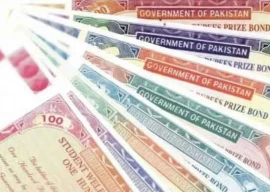
Is there a possibility of issuing a Shari’a compliant Diaspora bond (or Diaspora Sukuk) to attract investment from overseas Pakistanis?
Overseas Pakistanis comprise almost 3% of the country’s population, and either live as guest workers in the Gulf countries, or are permanently settled in the West, the Middle East and Far East Asia. These overseas Pakistanis with dual nationalities maintain very strong links with Pakistan, even after having lived in their adopted countries for decades. Such links include language, dress, sports and religion. Pakistaniyat has emerged as a lifestyle and not merely a nationality.

Pakistan is not the only country with such a strong bond with its overseas population. There are a number of other nations in the world which enjoy a similar kind of loyalty. The closest analogy to Pakistan is perhaps Israel, which is another country that came into being around a strong religious sentiment. India, although a secular country, is another example.
Both India and Israel have successfully issued Diaspora bonds in the past. Israel managed to raise US$32 billion and India raised US$11.3 billion. Israel’s Diaspora bonds programme is very old. It issued its first such bond in 1951 through Development Corporation of Israel (DCI) in support of the country’s very ambitious development agenda. The DCI was also registered with the Securities and Exchange Commission (SEC) in the USA allowing the investors to have liquidity. India’s Diaspora bonds programme, on the other hand, was managed by State Bank of India (SBI) through a series of bonds in 1991, 1998 and 2000. Its main objective was to support India’s balance of payments.
Apart from the success stories of India and Israel, there are also some cases of limited luck in raising capital using a Diaspora bond structure. Most notable are Ethiopia and Kenya. These countries failed to satisfactorily conclude their Diaspora bond primarily because of the track record of their previous oppressive regimes.
However, in Pakistan the conditions are fast improving. Following the successful transition of government after the recent general elections, it appears as if there is now the right environment for issuing a Diaspora Sukuk. The new government seems to be interested and actively involved in real economic activity, which should be helpful for raising capital from overseas Pakistanis. The new governor of Punjab, Chauhdary Muhammad Sarwar, who renounced his British nationality to assume his new role, can also play a lead role in raising capital from the British Pakistani Diaspora and Europe where he has acquaintances. The Pakistan-UK Chamber of Commerce and Industry, which is heavily influenced by the Sharif family, can also play a role in this respect.
The following steps could be taken to issue a Diaspora Sukuk for Pakistan:
A working committee should be set up with representatives from overseas Pakistanis communities around the world, Islamic finance experts, economists and policymakers. This working committee should be headed by Chauhdary Ghulam Sarwar, the new governor of Punjab.
The Diaspora Sukuk should be issued by a special purpose vehicle preferably based in the Dubai International Financial Centre (DIFC), and listed on NASDAQ Dubai. An international bank with strong presence in Pakistan should be appointed as a lead arranger, along with some Islamic banks that must include local as well as foreign Islamic banks.
Given the dwindling exchange rates of Pakistan rupee against major currencies, the proposed Diaspora Sukuk should be denominated in either the US dollar or in the British pound, to allay investors’ fears about depreciating values of their investments in Pakistan. The investors should receive regular and frequent returns on their investments in a foreign currency, with possibility of redemption of their investments at the end of the Sukuk period.
The best use of proceeds of the Diaspora Sukuk will be in long-term infrastructural projects in the energy sector, in addition to the commercial promotion of cultural areas that the Pakistani Diaspora feels strongly about. Part of the money can also be used to support the balance of payments.
The writer is an economist and a PhD from Cambridge University
Published in The Express Tribune, August 12th, 2013.
Like Business on Facebook, follow @TribuneBiz on Twitter to stay informed and join in the conversation.
COMMENTS (12)
Comments are moderated and generally will be posted if they are on-topic and not abusive.
For more information, please see our Comments FAQ









1732486769-0/image-(8)1732486769-0-270x192.webp)







Comparing India and Israel with Pakistan is not true. We are a rapidly deterioting economy, politically unstable and lack leadership that has a vision or ability to take action. Who in their right mind will invest in a country which has Karachi as a major port and financial hub. May be Altaf Hussain but no one who has earned with hard work
Issuing bonds is not a bad idea. Some people have raised some valid points but I am sure most of them can be addressed.
@indi...good at using very conveniently...
Pakistanis working in the middle east are actually bonded labour which is a polite word for slavery
israel and india ..... hmmm... whats up?
The writer has made some very valid points. Where the rates, time frame etc are concerned our capable finance minister and his team should be able to come up with the right mix. However, I would like to add that the money must be earmarked solely for development projects and not for BOP as there is a chance of the money not being optimally utilized.
Diaspora or not, an investor is going to invest in a country where his principal will be safe, will be guaranteed a good return, and lower currency depreciation risks.
Pakistan should try this option and the money should be used to pay off other costly loans or for support of budget deficit.I am not an economist but willing to put my two cents to help the motherland.
Unless the domestic atmosphere is conducive for investment it will be difficult to raise the debt from the Diaspora. Even if sentiments are attached with Pakistan financial decisions are taken by brain.Longer the period of bond ,higher will be the expected return for the risk mitigation. a comparison has to be made about the cost benefit analysis from other sources of external institutional borrowings .( particularly for infrastructure projects).
Bogus idea!
A few problems here. If the "bond" is going to be issued in and redeemed in a foreign currency such as the US$ or GBP, what return will the government of Pakistan offer? With interest rates in the West at historic lows for the foreseeable future, any eventual increase in US or UK interest rates will lead to an appreciation of their currency and add to the Government of Pakistan's debt repayments burden. Further, to actually get overseas Pakistani's to buy this bond, the return would have to be more than what they could earn through savings in their countries of residence. Who is going to underwrite these bonds and at what cost? If its cheaper for the Government of Pakistan to access long term ADB or WB financing why opt for a more expensive bond? Tugging on the emotional strings of overseas Pakistani's isnt going to make them cough up the money. Overseas Pakistani's already send money hope to their families, "invest" in national savings schemes and buy property. Will we really be able to garner sizeable funds from a bond issue given Pakistan's international credit rating?
An improvement in business and financial environment coupled with a fail in terrorism and violence will naturally suck in FDI, whether from overseas Pakistanis or foreign investors. Such schemes as the proposed bond will add to debt, and with no strings attached the state cannot be trusted to use the money in a manner to insure that we will be able to pay back the money in the longrun.